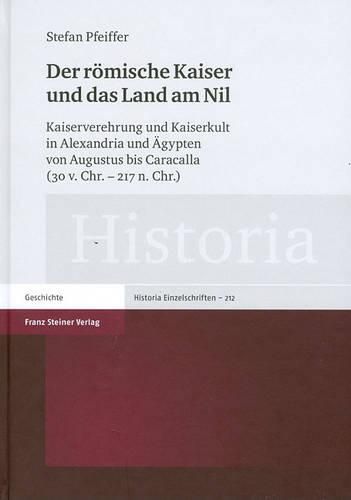Readings Newsletter
Become a Readings Member to make your shopping experience even easier.
Sign in or sign up for free!
You’re not far away from qualifying for FREE standard shipping within Australia
You’ve qualified for FREE standard shipping within Australia
The cart is loading…






English summary: Studies on the imperial cult in the Roman Empire are numerous, but the important province of Egypt has so far remained a stepchild of the old historical research. This volume for the first time offers both a chronological presentation and a systematic analysis of the imperial cult of emperor worship in Roman Egypt from Augustus to Caracalla. The author is interested in whether the ritual and non-ritual worship of the emperor served to show the legitimacy of domination on the one hand, and the creation of identity of the people on the other.
In chronological order, Stefan Pfeiffer starts by discussing the relationship of the various emperors to Egypt. He then moves on to demonstrate the religious, cultural and social structures on which the cult of the emperor and emperor worship are based. He also studies forms of expression and institutions that were established in this context. German text. German description: Studien zum Kaiserkult im romischen Reich sind Legion - doch ausgerechnet die wichtige Provinz Agypten blieb hier bisher ein Stiefkind der althistorischen Forschung. Dieser Band bietet erstmals sowohl eine chronologische Darstellung als auch eine systematische Analyse des Kaiserkults und der Kaiserverehrung im romischen Agypten von Augustus bis Caracalla. Dabei geht es dem Autor nicht zuletzt um die Frage, ob die kultische und nichtkultische Verehrung des Kaisers der Legitimation der Fremdherrschaft auf der einen und der Identitatsstiftung der Bevolkerung auf der anderen Seite diente. In chronologischer Reihenfolge beleuchtet Stefan Pfeiffer zunachst das Verhaltnis der verschiedenen Kaiser zu Agypten. Im zweiten Teil zeigt er die religiosen, kulturellen und gesellschaftlichen Strukturen, die dem Kaiserkult und der Kaiserverehrung zugrunde liegen. Ausserdem untersucht er deren Ausdrucksformen und die Institutionen, die in diesem Kontext aufgebaut wurden.
$9.00 standard shipping within Australia
FREE standard shipping within Australia for orders over $100.00
Express & International shipping calculated at checkout
English summary: Studies on the imperial cult in the Roman Empire are numerous, but the important province of Egypt has so far remained a stepchild of the old historical research. This volume for the first time offers both a chronological presentation and a systematic analysis of the imperial cult of emperor worship in Roman Egypt from Augustus to Caracalla. The author is interested in whether the ritual and non-ritual worship of the emperor served to show the legitimacy of domination on the one hand, and the creation of identity of the people on the other.
In chronological order, Stefan Pfeiffer starts by discussing the relationship of the various emperors to Egypt. He then moves on to demonstrate the religious, cultural and social structures on which the cult of the emperor and emperor worship are based. He also studies forms of expression and institutions that were established in this context. German text. German description: Studien zum Kaiserkult im romischen Reich sind Legion - doch ausgerechnet die wichtige Provinz Agypten blieb hier bisher ein Stiefkind der althistorischen Forschung. Dieser Band bietet erstmals sowohl eine chronologische Darstellung als auch eine systematische Analyse des Kaiserkults und der Kaiserverehrung im romischen Agypten von Augustus bis Caracalla. Dabei geht es dem Autor nicht zuletzt um die Frage, ob die kultische und nichtkultische Verehrung des Kaisers der Legitimation der Fremdherrschaft auf der einen und der Identitatsstiftung der Bevolkerung auf der anderen Seite diente. In chronologischer Reihenfolge beleuchtet Stefan Pfeiffer zunachst das Verhaltnis der verschiedenen Kaiser zu Agypten. Im zweiten Teil zeigt er die religiosen, kulturellen und gesellschaftlichen Strukturen, die dem Kaiserkult und der Kaiserverehrung zugrunde liegen. Ausserdem untersucht er deren Ausdrucksformen und die Institutionen, die in diesem Kontext aufgebaut wurden.